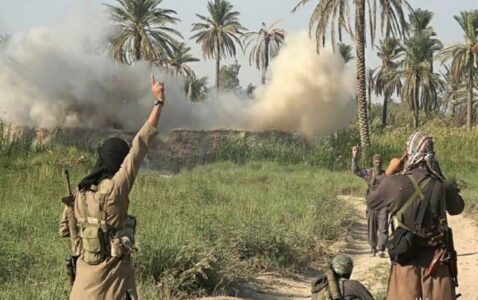
Islamic State is regrouping and gaining strength in Iraq’s disputed territories
A Peshmerga ministry official warned on Tuesday of the Islamic State (ISIS) group’s growing strength and reorganization in Iraq, particularly in areas disputed between Erbil and Baghdad.
“There have been around 15 activities from January 1 until now, most of them were in [disputed] regions like Diyala, Kirkuk, Salahaddin,” Deputy Minister of Peshmerga Sarbast Lazgin told Rudaw’s Hawraz Gulpy on Tuesday. “Some of these attacks were effective, they were strong attacks, they have become stronger than they were before.”
“They are reorganized. New people have joined them” who have entered Iraq from Syria, Lazgin claimed. They are “mostly seen south of [Mount] Qarachogh.”
He added that ISIS militants are sometimes spotted wearing the uniforms of Iraqi soldiers or federal police.
Despite the group’s territorial defeat in Iraq in December 2017, remnants of the group have returned to earlier insurgency tactics, ambushing security forces, kidnapping and executing suspected informants, and extorting money from vulnerable rural populations.
Colonel Wayne Marotto, Operation Inherent Resolve (OIR) Spokesman, denies that ISIS is resurging in Iraq.
“Daesh (ISIS) is resilient, and remains a serious challenge, but relentless pressure by our partner forces in the ISF (Iraqi Security Forces), in the SDF (Syrian Democratic Forces), in Peshmerga forces will prevent a re-emergence of Daesh,” he told Rudaw’s Snur Majid on Tuesday.
“I don’t see any kind of resurgence of Daesh” because of the work the coalition is doing in coordination with Kurdish and Iraqi forces, he noted.
From January 1 to 22, “the ISF with the support of the support of the coalition has conducted 68 operations,” Marotto added.
Srood Salih, a Peshmerga commander, detailed to Rudaw’s Sangar Abdulrahman on Tuesday some of the ways ISIS wreaks havoc amongst residents of the disputed territories, where tensions between the government in Baghdad and the Kurdistan Regional Government (KRG) have rendered security patchy.
“The people [in the disputed territories] are poor, they live on agriculture … if the farmer or the poor man doesn’t give them the money or help them, they will either kill them or burn their farms,” said the commander of how the group’s militants forcibly insert themselves into vulnerable communities, noting that they often demand the financial help in the name of Zakat (almsgiving).
He added that the Little and Upper Zab rivers have become a source of life for ISIS militants, who hide in surrounding forests, hunt, use their water. He also noted that the vastness and space of the Qaraj plains have made the militant’s movements harder to find.
“If the Peshmerga is doing an operation they [ISIS militants] will go further down to Hamrin and Qaraj plains, if the Iraqi army is doing an operation they will come back up to that space again,” said Salih.
A farmer from the disputed territories, who spoke on condition of anonymity, told Rudaw’s Hardi Mohammed on Tuesday of his experience at the hands of the insurgent group.
“Once the crops grow, they [ISIS] ask for money, and Kurds won’t give them money, and if you don’t they will burn your crops. They have burned them this year, last year, and the year before,” he said, adding that all the Kurdish villages west of Mount Qarachogh, where ISIS is mostly active, have been abandoned due to the insecurity.
ISIS has claimed responsibility for a double suicide bombing in central Baghdad’s Tayaran Square on January 21 that left more than 30 dead and 110 injured.
According to its propaganda agency Amaq, the terror group carried out 1,422 attacks in Iraq in 2020, with the highest number of attacks recorded in Diyala province.
A total of 2,748 people were killed as a result, the agency said earlier this month.
Two ISIS militants were killed in an airstrike in Kirkuk province, the Iraqi military’s official media source said on Sunday.
Source: Rudaw





